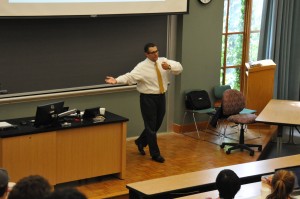Simplifying a Complex World: IMF Economist Karim Youssef Presents Network Analysis Mapping and Management of Global Risk
 In late September, the International Money Fund’s (IMF) new tool for understanding the interconnectedness of the global economic world was unveiled to a college audience for the first time in history. co-author Karim Youssef of the IMF introduced the network analysis mapping model to a rapt audience of policy studies, math, economics, physics, and biology students and faculty.
In late September, the International Money Fund’s (IMF) new tool for understanding the interconnectedness of the global economic world was unveiled to a college audience for the first time in history. co-author Karim Youssef of the IMF introduced the network analysis mapping model to a rapt audience of policy studies, math, economics, physics, and biology students and faculty.
In order to understand the business of keeping financial systems stable, says Youssef, “’you can’t just say ‘we need to create jobs.’ We need good analytical tools to look at the world as it actually is, a complex system of economic and financial interconnectedness.”
The IMF’s network analysis mapping model is just that tool.
Network analysis is useful because it makes systems easier to understand, and it is powerful because it captures, mathematically, the relationships and patterns within a given system, no matter how complex.
The new IMF model, which is based on graph theory, relies on such factors as degree, centrality, strength, and closeness in order to generate true and deep understanding of a system. An endless stream of topics can be mapped using the model, from global banking to global warming, and from the implications of changing policy agendas to changing world trade patterns.
The networks allow economists to generate relevant questions, to have “aha!” moments, to understand the interactions between risks and the structure of connections—and, therefore, how to change them if necessary. Youssef enthusiastically described the way in which networks can be manipulated to answers a multitude of questions. Even the data itself can be created “if you know what you are asking.”
“Network analysis has changed the world,” Youssef says. “Just look at Facebook and Google.”
Students in the Emerging Market Economics class had a special opportunity to walk through the process of creating the model. Guided by Youssef, they examined trade and financial flows in a hands-on workshop to evaluate risk.
Karim Youssef worked as a public and private sector consultant before joining the IMF during the height of the global financial crisis in 2009. Within the IMF, he has given expertise to the Monetary and Capital Markets Department and the Strategy, Policy and Review Department, among other areas. He currently serves in the IMF’s Risk Management Unit within the Office of the Managing Director. Youssef’s primary focus is in developing an enterprise-wide risk management framework.
The day’s events were co-sponsored by the Policy Studies Program, Economic Empowerment and Global Learning Project, Department of Economics, and Investment Club.